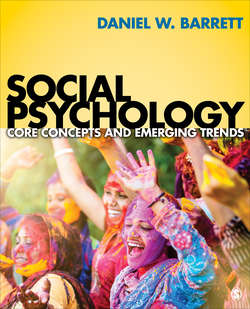Читать книгу Social Psychology - Daniel W. Barrett - Страница 166
На сайте Литреса книга снята с продажи.
False Consensus and False Uniqueness
ОглавлениеWould you prefer to be like most other people or different from them? It probably depends on what aspects of yourself you are thinking about. In some domains—such as opinions and behaviors—people would rather that others see the world in the same way that they do, but in others—such as personal abilities—we prefer to stand out. Oftentimes people believe that their opinions or behaviors are more common than they actually are, and thus exhibit the false consensus effect (Mullen, 1985; H. S. Park, 2012; L. Ross, Greene, & House, 1977). In one study, students were asked to wear a sandwich board sign displaying either “Repent” or “Eat at Joe’s” for 30 minutes. Whether they said yes or no, each estimated how many other students were likely to agree to the same request. Most of the participants overestimated the number of students who would make the same decision that they did. This was especially true for those who agreed to wear the “Eat at Joe’s” sign: Only 30% of the students actually agreed to carry it, but they predicted that 57% of other students would (L. Ross et al., 1977).
People demonstrate the false consensus effect in many arenas of life, including adolescents’ predictions of peer substance use and adults’ estimates of how others will respond to particular behavioral experiences or how many showers others will take during a shower ban (Henry, Kobus, & Schoeny, 2011; Kammrath, 2011; Monin & Norton, 2003), and are especially likely to do so when in an opinion minority (Marks & Miller, 1987). For instance, Whitley (1998) found that sexually active college women overestimated the level of sexual activity of other college women, as compared to the estimates of nonsexually active women. Believing that other people hold the same opinions or engage in the same behaviors can maintain our self-esteem (Marks & Miller, 1987), and avoiding discussion of topics on which there is potential disagreement may help us maintain this belief (Goel, Mason, & Watts, 2010).
Although we often find comfort when we think others are similar to us, there are times when we’d prefer to stand out from the crowd. This primarily occurs with respect to one’s abilities or competencies, because we’d like to think that we are uncommonly talented. As in the case with false consensus, we are often mistaken about how we compare to others, except that here we inaccurately believe that we are different from them. For instance, people who engage in socially desirable behaviors, like giving blood, may underestimate how many others would do the same (Goethals, 1986). When we hold incorrect beliefs about how different we are, we demonstrate the false uniqueness effect, and as with the false consensus effect, this tendency serves to enhance our self-esteem (Goethals, 1986; Monin & Norton, 2003; H. S. Park, 2012). Both the false consensus and false uniqueness effects stem in part from our lack of knowledge of the true attitudes or attributes of others.
Are you more or less socially skilled than the average person? More ethical? A better driver? Well, most people believe that they are more ethical and are better-than-average drivers, even if they have a history of auto accidents (Guerin, 1994; Lovett, 1997). In fact, you probably think that you are better-than-average on most desirable characteristics, which is called the better-than-average effect (see Research box 4.1) (Gilovich, 1991; Guenther & Alicke, 2010). This effect is also known in the United States as the Lake Wobegon effect, because in Lake Wobegon, the fictional community invented by Garrison Keilor, “the women are strong and the men are good-looking and all the children are above average.” When do people prefer to see themselves as distinct versus similar to others? It depends on the desirability of the behavior in question. If the behavior is seen as positive, then people overestimate their uniqueness; however, for our negative behaviors, we’d rather believe that many others do them as well (Marks, 1984).
False Consensus Effect: Believing that one’s opinions or behaviors are more common than they actually are
False Uniqueness Effect: Holding incorrect beliefs about how different one is from others
Better-Than-Average Effect: Judging that one is above average on most desirable characteristics
